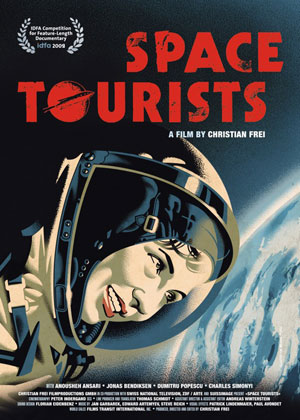
Earlier this week I got to see the film Space Tourists during a screening as part of the AFI Silverdocs film festival in Silver Spring, Maryland. This film has been out for some time but has been limited to the film festival circuit; it first appeared in the US at Sundance earlier this year and Ryan Kobrick wrote a good review of the film for The Space Review.
My own impressions of the film are mixed. Part of the film is about the spaceflight experience, in particular the flight of Anousheh Ansari, but as much or more is about life in Kazkhastan, with imagery of abandoned apartment blocks and crumbling infrastructure. The film follows a group of scavengers who travel out to where the first stages of the Soyuz rocket that launched Ansari fall back to Earth; they cut up the metal and sell it for scrap. At times the film juxtaposes the two: we see the metal collectors immediately pull out of the rocket stage a small tank that looks like a cooking pot so they can use it exactly for that—a pot to cook their meals in over an open fire. We then see Ansari and her crewmates on the ISS prepare their own prepackaged meals on the station.
Another portion of the film steps away from the ISS and Kazakhstan to look at the effort by one Romanian group, ARCA, led by Dumitru Popescu, to develop their own vehicles. ARCA competed in the Ansari X PRIZE and is a team in the Google Lunar X PRIZE; the film shows their efforts to loft a subscale rocket on a solar-heated balloon. It’s an odd choice for a film supposedly about space tourism: this particular ARCA effort isn’t directly about space tourism, while a number of other ventures are focused on space tourism and arguably making faster progress than ARCA.
The film is neither blatantly pro- or anti-tourism. In a brief Q&A session after the screening, director Christian Frei said he was drawn to the topic after reading a short newspaper article about Daisuke Enomoto, who had planned to fly to the ISS on a Soyuz flight. Enomoto was rejected for health reasons and Ansari, who had been training as his backup, took his place. Ansari provided him with the footage she shot while on the station for his documentary without any conditions, he said. That was a relief to hm, he said, since dealing with “billionaires”, as he put it, “was a challenge”. (Ansari is not quite a billionaire.)
One comment by Frei struck me late in the Q&A session. Asked about the inclusion of ARCA in the film, he said that he wanted to feature someone in the film who wants to go to space “with his own tools” instead of simply buying a ticket. “I love this guy and his dream of going and flying to the Moon as a Romanian,” he said. “This is the most expensive thing that you can imagine. And of course he won’t get there, but, you know, theoretically it would work.” In some sense he’s right: it is unlikely that the small, undercapitalized ARCA team will be able to land a spacecraft on the Moon as required for the GLXP; after all, the team was never able to develop a suborbital rocket for the original X PRIZE competition. But, unlike Frei, I’d be cautious about completely writing off ARCA or anyone else striving to turn a dream into reality.

Leave a Reply